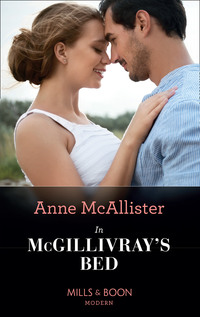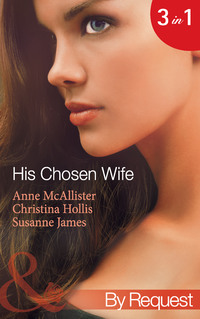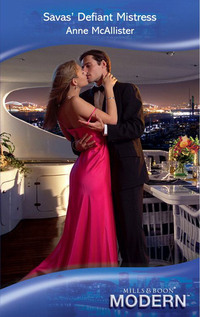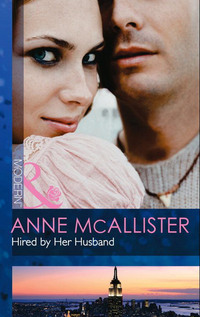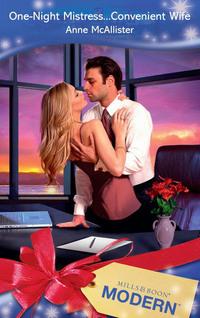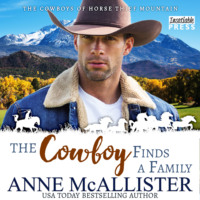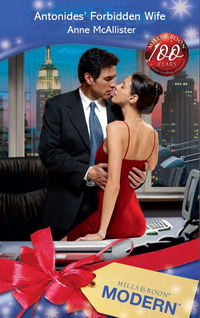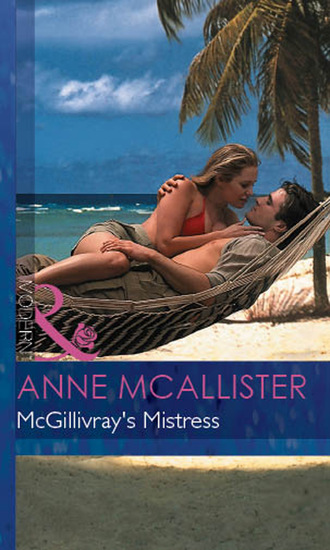
Полная версия
Mcgillivray's Mistress

“I hear we’re having an affair.”
Fiona turned as red as her hair. “We’re not!”
“I know.”
“It’s ridiculous!” She was pacing now, waving her hands, color still brilliant in her cheeks. “It’s because they saw you leaving here in the morning. They think you spent the night!”
“I did.”
“They think you slept with me!”
“Not a bad idea,” he murmured.
“The whole damn island thinks that I’m your mistress!”
Lachlan grinned at her. “Now, there’s an even better idea!”
Harlequin Presents® is proud to bring you a brand-new trilogy from international bestselling author
ANNE MCALLISTER
Welcome to

The McGillivrays of Pelican Cay
Meet:
Lachlan McGillivray—he’s ready to take his pretend mistress to bed!
Hugh McGillivray—is about to claim a bride….
Molly McGillivray—her Spanish lover is ready to surrender to passion!
Visit:
the stunning tropical island of Pelican Cay—full of sun-drenched beaches, it’s the perfect place for passion!
Don’t miss this fantastic new trilogy:
McGillivray’s Mistress—(#2357)
McGillivray’s Mistress
Anne McAllister


MILLS & BOON
Before you start reading, why not sign up?
Thank you for downloading this Mills & Boon book. If you want to hear about exclusive discounts, special offers and competitions, sign up to our email newsletter today!
SIGN ME UP!
Or simply visit
signup.millsandboon.co.uk
Mills & Boon emails are completely free to receive and you can unsubscribe at any time via the link in any email we send you.
For Cathy and Steve the best of friends For Sid, the finest of felines For Bob, Dyl and Spiff, who have to put up with him And for Ange and Sparks whose head definitely won’t fit through the cat flap after this!
With thanks to Gail Chavenelle, whose sculptures inspired Fiona’s and who so generously shared her expertise with me
CONTENTS
CHAPTER ONE
CHAPTER TWO
CHAPTER THREE
CHAPTER FOUR
CHAPTER FIVE
CHAPTER SIX
CHAPTER SEVEN
CHAPTER EIGHT
CHAPTER NINE
CHAPTER TEN
CHAPTER ONE
SOME PEOPLE called it “sculpture.” Lachlan McGillivray begged to differ.
As far as he was concerned, the monstrosity on the beach in front of his elegant upscale Moonstone Inn was—pure and simple—“trash.”
What else could you possibly call the nightmare—ten feet high and growing—that had begun to arise a month ago from the flotsam and jetsam that washed up on Pelican Cay’s beautiful pink sand beach?
“Delightfully inventive,” an article in last Sunday’s Nassau paper called it. “A creative amalgam,” the Freeport newspaper had said. “Fresh and thought-provoking,” the art critic from a far-reaching Florida daily claimed.
“Deliberate nose-thumbing,” was Lachlan’s opinion. It was just Fiona Dunbar having a go at him.
Again.
Fiona Dunbar had been a pain in the posterior—his posterior!—since he and his family had moved to the small Bahamian island when Lachlan was fifteen.
Life in suburban Virginia with its soccer leagues and its supply of cute blonde cheerleaders had been all he’d ever wanted back then. Being uprooted and transplanted to a remote Caribbean island just so his father could satisfy a need for wanderlust at the same time that he pursued his career as a family physician had infuriated Lachlan, though the rest of the family had come willingly enough.
In fact his brother, Hugh, two years younger, and his sister, Molly, six years his junior, had been delighted to trade their stateside existence for life in the sticks.
“There’s nothing to do there!” Lachlan had complained.
“Exactly,” his father had said happily, looking around at the miles of deserted beach and the softly breaking waves and then up the hill at the higgledy-piggledy scatter of pastel-colored houses, its 350-year-old rusting cannon, and the half-overgrown cricket field with its resident grass-mowing horse. “That’s just the point.”
Lachlan hadn’t been able to see it then. He’d thought it was the most boring place on earth, and he’d said so often.
“So leave,” Molly’s best friend, the supremely irritating Fiona Dunbar had said, sticking her tongue out at him.
“Believe me, carrots, I would if I could,” he’d replied.
And he had—as soon as his acceptance had come from the University of Virginia. He’d been gone four years, returning only occasionally to see his parents. Then he’d gone on to Europe to play soccer in England, Spain and Italy, and had come back even less often, and then only to regale family and friends with tales of life in the fast lane.
But oddly, the longer he was gone, the more he found himself remembering the good things about Pelican Cay. The more he’d awakened in the morning in this big city or that one and listened to the birds cough, the more fondly he’d remembered waking to island birds and island breezes. The more he moved frenetically from one place to another, the more he appreciated the slower island pace. He liked the autobahn and the Louvre and the centuries of European culture. He liked French cuisine and Italian delicacies and Spanish wines. But sometimes he missed a slow amble down a potholed road, a one-room island historical society, the 350-year-old rusty cannon, a plate of conch fritters and a long cold beer.
A couple of years ago, when Hugh had come back to start his island charter service, Fly Guy, in Pelican Cay, even though their parents had moved back to Virginia, Lachlan had thought his brother had the right idea.
“I’ll probably come back when I retire, too,” he’d said.
Hugh had raised dark brows. “And do what?”
Hugh had gone to college, then into the U.S. Navy where he’d been a pilot for eight years. But always a beachcomber at heart, he’d finally bolted the regimented world and was never happier than when he was lying in a hammock, drinking a beer and watching the waves wash up on the shore.
That was not Lachlan. Lachlan had always had goals. He’d made up his mind at the age of twelve that he was going to be “the best damn goalkeeper” in the world and he’d never swerved from his pursuit of that.
While his parents had scowled at his profanity, they’d admired his determination—and his success. He’d spent sixteen years as one of the best goalkeepers in the world. But even he couldn’t play in goal forever.
It was a young man’s game. A young healthy man’s game. Retirement had come last summer, at the age of thirty-four, when a serious knee injury had so compromised his quickness that Lachlan knew it was time. His mind was as quick as ever, his anticipation as great. But he would never get his edge back physically. And he refused to play down a level.
There was only one place to be—at the top.
Fortunately, he’d been buying up real estate for the past four years. Eighteen months ago he’d decided on his post-soccer career and had, with his customary determination, set about accomplishing it. First he’d bought the Mirabelle, a small elegant inn at the far end of Pelican Cay. It was already a thriving business and he could step right in whenever he wanted to. That made sense to everyone.
But when the Moonstone, then called the Sand Dollar, came on the market and he bought that, everyone had been appalled.
“What the hell are you going to do with that?” Hugh had demanded. The eighty-year-old, three-story clapboard structure with its peeling paint and sagging verandas had looked like nothing but work to him.
“I’ll restore it and refurbish it,” Lachlan had said, relishing the prospect.
“What do you know about building restoration?” Hugh raised skeptical brows.
And Lachlan had had to admit he’d known very little. But the challenge drove him. He’d thrown himself into it with vigor and enthusiasm. He’d learned and studied and worked. He’d hired lots of help, but he’d been right in there doing his part, determined to “turn it into the best damn inn in the Caribbean.” It had been open over a year now, and was doing very well.
“Pretty soon,” Lachlan had told Hugh not long ago, “it will become the destination of choice for active discriminating travelers, those who have the brains and the soul to appreciate the true beauty of the islands.”
Hugh had stopped humming along with Jimmy Buffett long enough to look up from his hammock and laugh. “The way you appreciated it?”
But Lachlan just shrugged him off. “You’ll see. It will be great. For the tourists and for the island. The Mirabelle will still take the old guard—those folks who have been coming for years. But the Moonstone will attract the newcomers. And that will be good for Pelican Cay. The island could use a kick in the butt. Something has to jumpstart the economy. Fishing’s not enough now. They need to diversify and—”
“The zeal of the converted,” Hugh had shaken his head and closed his eyes.
Which was true enough, Lachlan supposed. As much as he’d resented Pelican Cay all those years ago, all he could see were possibilities now—
And a ten-foot monstrosity every time he opened the blinds.
He scowled out the window again. The monster seemed to have gained another arm overnight. A bent driftwood spar thrust upward from its side, and something not quite discernible in the early morning half-light fluttered from its outflung hand.
Plastic? Seaweed? Whatever it was, it taunted him.
He turned away again and flung himself into the chair at his desk and tried to focus on the correspondence that his assistant and the Moonstone’s manager, Suzette, had left for him to sign and the mail that had arrived while he was gone.
He’d been away since Saturday, having flown to the Abacos to oversee some renovations at the Sandpiper, the next in the series of inns he was renovating. He’d returned very late last night and had deliberately avoided glancing at the thing when Maurice, one of the island’s taxi drivers, had dropped him off at the door.
Bad enough that he’d felt compelled to open the blinds this morning to see what further effrontery Fiona had achieved.
He tried to ignore it and get back to the business at hand. He had plenty of pressing things to worry about. But his fingers strangled his pen as he scanned and signed half a dozen letters, then read the post that had arrived since he’d left.
The last one was a response to a letter he’d dictated in the spring. The Moonstone had done well all on its own during the winter months. Sun-seeking snowbirds from the northern climes had filled the rooms every night. But summer and fall occupancy was more problematic. So he’d sent notice of its existence to several exclusive tour agencies and travel magazines, encouraging them to send a representative to see what the Moonstone had to offer.
A couple of the tour companies had, including the impressive Grantham Cultural Tours whose founder was arriving later this week. This particular letter, however, was a response from an upscale travel magazine called Island Vistas.
“Will be arriving next week,” the tour rep had written. “The ‘quiet island elegance’ you mention hits exactly the right note. The Moonstone sounds exactly like the sort of place our readers love.”
Quiet island elegance! Oh yeah, right. With a ten-foot steeple of trash growing on its doorstep?
“Well, it’s quiet,” Hugh had said cheerfully last week when Lachlan had complained about it. He was enjoying Fiona’s tactics as they weren’t aimed at him. “Doesn’t make a sound. Does it?”
It didn’t have to. It was a visual scream. It was an affront to him—and to the sensibilities of the inn’s guests. And if that wasn’t annoyance enough, there were always the bagpipes.
“Bagpipes?” Hugh had stared at him.
“Wait,” Lachlan had raised a hand to still his brother’s protest. “Just wait.”
And after they’d eaten in the inn’s dining room, he’d insisted Hugh sit on the deck of the Moonstone and wait until night fell on Pelican Cay—and the miserable tremulous bleat and warble of an off-key Garryowen drifted toward them on the breeze.
Hugh’s stunned expression had given Lachlan considerable satisfaction. But he would gladly have forgone it, for the pleasure of hearing nothing but the waves breaking on the sand. He arched his brows to say Now do you believe me?
“You don’t know it’s Fiona.”
“Who the hell else could it possibly be?”
Fiona Dunbar had been systematically driving him crazy since she was nine years old.
She and his sister, Molly, were the same age and, from the moment they met, had become best friends. Why he—a mature and lordly fifteen at the time—should have had to suffer being constantly plagued by two grubby-faced, sassy, stubborn little monsters was beyond him.
But he had been. Molly and Fiona had followed him everywhere, dogging his footsteps, pestering him continually, watching everything he did—spying on him!—and wanting to do it, too.
“Be nice to them,” his mother had admonished time and time again. “They’re just little girls.”
Little demons, more like. And regardless of his mother’s strictures, Lachlan had done his best to chase them away. He’d snarled at them, growled at them, roared at them. He’d threatened them and slammed his bedroom door on them. But they’d persisted.
“They admire you,” his mother had said.
“They’re trying to drive me crazy,” Lachlan replied.
But nothing had got rid of them until the day Fiona had heard him telling a college girl he’d met on the beach how awful it was living on Pelican Cay and how glad he’d be to leave.
“It’s the end of the earth,” he’d said. “There’s nothing worth having here.”
“So leave,” Fiona had blurted, her fury turning her complexion as red as her hair.
As he hadn’t been talking to her—hadn’t even realized she was nearby—he and the girl he’d been talking to had both stared at her in surprise.
“Just get on a boat and get out of here,” Fiona had gone on angrily. “Or better yet, swim. Maybe you’ll drown! Go to hell, Lachlan McGillivray!” And she’d spun away and run down the beach.
“Who’s that?” the blonde had asked him. “And what’s her problem?”
Lachlan, embarrassed, had shrugged. “Who knows? That’s Fiona. She’s just a nutty kid.”
And he would be extremely glad when she grew up!
Or at least he’d thought he would be.
Somehow, though, Fiona Dunbar, all grown-up, turned out to be worse.
Her stick-straight body had developed curves somewhere along the way. Her carroty red hair, which back then had been ruthlessly tamed into a long ponytail, had, in the past couple of years, become a free loose fiery curtain of auburn silk that begged to be touched. As did her skin which was creamy except where it was golden with freckles. And that was the most perverse thing of all—even her freckles enticed him!
It wasn’t fair.
He hadn’t come back to Pelican Cay to notice Fiona Dunbar! Perversely, though, he couldn’t seem to help it. She was here. She was unattached. And she was, by far, the most beautiful woman on the island.
But unlike every other woman between the ages of seven and seventy—virtually all of whom had fallen all over themselves trying to impress Lachlan McGillivray during his soccer-playing career—Fiona Dunbar wanted nothing to do with him.
So he wasn’t God’s gift to all women. Lachlan still had had more than his share of groupies over the years. And while he didn’t think he was drop-dead handsome, women seemed to like his deep blue eyes, his crooked grin and his hard dark looks.
Wherever he’d gone, certainly plenty of women had followed—chatting him up in bars, tucking their phone numbers in the pockets of his shirts and trousers, ringing him at all hours of the day and night, clamoring to be the one in his bed on any given night—even offering him their underwear!
Four years ago, at the height of Lachlan’s popularity, a magazine interviewer witnessing a woman doing just that, had asked him if that sort of thing happened often.
“Well, sometimes,” Lachlan had admitted honestly because it was only the truth. And then because that sounded arrogant, he’d joked, “But I only keep the red ones.”
And just like that, dear God, an urban legend had been born!
Two days after the magazine hit the stands the first pair of red panties arrived in his mail. Dozens more followed. He’d been deluged—at his home, at the club, at the hotels on the road. More stories followed. And so did more pairs of panties. Before long every scandal sheet across Europe was filled with women claiming their panties were the centerpiece of Lachlan McGillivray’s collection.
It didn’t matter that none of it was true, it was a great story.
Next thing he knew he had a worldwide fan club whose membership was three-quarters women. The club sent out thousands of autographed pictures of him leaping, legs and arms outstretched, to make a spectacular save.
“They admire my ability,” Lachlan said modestly whenever he had been asked about the extent of his popularity.
“They admire your legs,” his sister Molly had said flatly, shaking her head at the extent of female idiocy. “Men in shorts! Some women just can’t get enough of them.”
Most women, in Lachlan’s experience.
Not Fiona Dunbar.
She hated him. Eighteen months ago she’d proved it. He and a couple of his teammates had come to Pelican Cay to visit his brother, Hugh, over Christmas. Molly had gone to see their parents in Virginia, but because he had work to do in the islands, Hugh couldn’t go. So, feeling a bit homesick, he had invited his brother to visit him for the holidays.
“Not that I expect you to come,” he’d said cavalierly. “I’m sure you’ve got plenty of other more fascinating places to go.”
Lachlan had. Between the demands of goalkeeping and his frenetic social life—even without the red panties collection it was pretty hectic—there was rarely a dull moment. That Christmas he’d gone to Monaco to live it up day and night with a girl called Lisette. Or was it Claudine? Suzanne?
Or all of the above. The fact was, there had been plenty—more than plenty—of willing women.
Two days before New Year’s, though, exhausted from a season of hard work and a holiday of hard play, he thought that spending a week or so of solitary celibate days on a deserted pink sand beach sounded like heaven.
He’d said as much to Joaquin Santiago and Lars Erik Lindquist, two of his equally hard-driving, hard-living teammates. And twenty-four hours later, the three of them had arrived on Pelican Cay.
Still hung over when Hugh met them in Nassau, Lachlan had sworn, “No booze. No babes. Just sand and sun and sleep.” And at his brother’s disbelieving look, he’d yawned and nodded as firmly as his aching head would permit. “My New Year’s resolutions.”
Bad news, then, that the first person he saw later that day was a Titian-haired beauty in a bikini sashaying past Hugh’s tiny house, heading toward the beach.
“Who the hell is that?”
“Fiona,” Hugh said offhandedly. “Dunbar,” he’d added at Lachlan’s blank look. “You remember—Molly’s friend.”
“Fiona?” Lachlan’s voice had cracked with disbelief. “That’s Fiona Dunbar?” That total knockout?
Hugh grinned. “Doesn’t much look like Fiona the ferret these days, does she?” That was what they had dubbed her at age ten, when she and Molly the mole had been sneaking around after them every day.
Lachlan sucked air. No, she didn’t look much like Fiona the ferret. She looked drop-dead gorgeous. Delectable. Beddable.
His “no babes” resolution began to crack. He kept an eye out for her after that. But while he saw her frequently over the next few days, she never came near.
She was taking care of her father, Hugh told him. A former fisherman, Tom Dunbar had had a stroke some years back, not long after Fiona had graduated from high school. She’d spent the next ten years taking care of him.
“And working,” Hugh said. “She works at Carin Campbell’s gift shop. And she sculpts.”
“Sculpts?” Lachlan had looked doubtful.
“Oh yeah. Sand sculptures. Shells. Even metal. Cuts them and bends them into shape—like paper dolls.”
Lachlan couldn’t imagine. But he wandered down to Carin’s shop later that day to buy some postcards, and he found quite a few of Fiona’s pieces. He had to admit they were pretty impressive—pelicans and other shore birds, palm trees and hammocks and fishermen. She was selling sketches there, too. And caricatures.
Then he realized that the witty sculpture Hugh had hanging in his house—one of him looping the loop in his seaplane—was a Fiona Dunbar piece, as was the caricature of Maurice at the custom’s house taxi stand, and the one of Miss Saffron the straw lady which he spotted hanging on her porch.
She drew caricatures of tourists and sold them the sketches on the beach. She even drew Lars Erik and Joaquin as they’d ogled the bikini-clad women on the beach. He knew that because Lars Erik had bought it from her.
She drew everybody and their dog. But she never drew him.
It rankled. Lachlan didn’t like being ignored—particularly when he hadn’t managed to ignore her.
Finally, when a week had gone by and she hadn’t even said hello to him, he’d had enough, especially since he’d just told Joaquin and Lars Erik that he’d known her for years.
“I don’t believe it,” Lars Erik said.
They were sitting in the Grouper, drinking beer, and Fiona had just come in, carrying a folder with some sketches in it, which she’d hugged against her breasts as she scanned the room. She’d spared Lars Erik a brief smile, but had skipped right over Lachlan as if he were invisible.
“She’s just miffed because a long time ago I didn’t like her precious island,” he explained.
“Oh, right,” Lars Erik said, nodding his head.
“Probably doesn’t even know her,” Joaquin speculated with a sly grin.
“Of course I know her. She’s a friend of my sister’s. Her name is Fiona Dunbar. Isn’t it?” he said to the bartender.
The bartender, Maurice’s son Michael, grinned broadly. “That be Fiona, all right.”
“So you know her name,” Lars Erik said. “So what? Invite her over to have a drink with us.”
“He doesn’t know her,” Joaquin said.
So he had to prove it. With Joaquin and Lars Erik egging him on, he’d strode over to where Fiona had just handed a pair of sketches to a tourist couple. He smiled his best charm-the-ladies smile and invited her to have a drink with him.
She blinked, then shook her head. “With you? I don’t think so.”
He stared at her, astonished at her refusal. “What do you mean, you don’t think so?” He was annoyed that she’d said no, more annoyed that she didn’t seem to recognize him, and most annoyed by the fact that the closer he got to her the more gorgeous she became.
He wanted to see flaws. There weren’t any.
“Maybe you don’t remember me.” It was possible, he supposed. He didn’t think he’d changed that much, but she sure as hell didn’t look the way she used to!
“Oh, I remember you,” she said, and gave him a blinding smile as she slipped between him and the barstool. “That’s why I don’t want to.”


